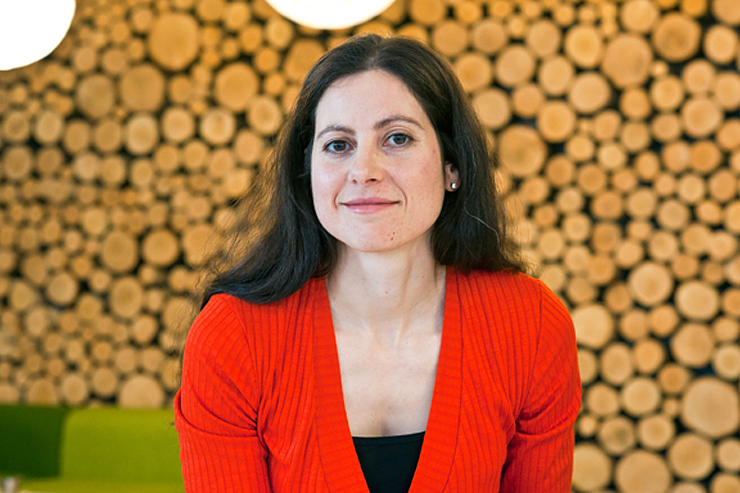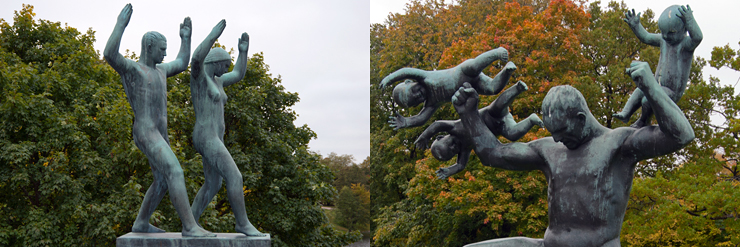To Christina Archetti, having children was never all that important. However, when she realized that most likely she would never have any, she suddenly felt like a failure.
The feeling was especially strong on the day she was promoted to a professorship at the Department of Media and Communication. She had finally reached her goal: the sign on the door was changed, her salary increased and she was provided with new business cards. Otherwise, however, everything was just as before.

‘It was a huge anticlimax. All the work I had done for the last twenty years had been for this end. I started asking myself whether I had done it all wrong. How could I have been so stupid? I had missed out on the very meaning of life.’
Now with hindsight, she thinks it strange that the feeling of having failed was so strong, despite the fact that having children had never been particularly important to her. It felt as though she lacked something that everybody else had.
No Child Zone
- The research project: ‘Unpacking the No Child Zone: Media, Communication and Technology in the Making and Mobilization of Childfree and Childless Identities’
- Thirteen women were interviewed in a pilot study. A number of childless women and men who have wanted to be interviewed by the project have contacted the researcher.
The project goals include understanding the importance of communication to establish a shared identity among childless people, explaining how the media influence childless people’s self- perception, and better understanding the challenges to the welfare state with regard to fertility.
English distinguishes between the two words ‘childless’ and ‘childfree’. The first refers to women who have wanted to have children, but have none. The second refers to women who have chosen not to have children.
Norwegian has only one term: ‘barnløs’ (‘childless’). In other words, if you have no children, there is something lacking.
For her own part, Christina Archetti asked herself how depressed she would let this make her. She and her husband had tried for six years; how much time should she spend longing? She also questioned how other women in her situation felt, and she decided to study this as a researcher.
She knew that she was not alone. One in every five women in Western countries has no children. In Norway, this proportion is one in every seven. Moreover, one in every four Norwegian men will never be a father.
A painful topic
So far, she has interviewed 13 Norwegian, Swedish, Danish and Italian women. She has listened to stories of grief and longing, of years of trying and disappointments, of the feeling of having failed and of being an outsider.
‘Interviewing these women is different from interviewing politicians or diplomats. This is a topic that many want to discuss, but it’s painful. It is perhaps easier for them to talk to me than to many others, since I have no children myself. Many of them have said that they are glad to be able to talk to me, that they can tell me things that others don’t understand,’ Archetti says.
The women she interviews are in various situations. One of them is a bonus mum, and although she loves the children, she asks herself whether it is worth all the effort. Another woman has gone through close to ten attempts at in vitro fertilization.
‘Why does someone choose to go through so many attempts, with all this involves? I don’t believe that this is only about a deeply felt wish to have a child, I believe that it also stems from pressure exerted by society. I have met women whose lives have nearly been destroyed. If life without children were a more tangible alternative they may not have gone to such lengths.’
Mothers who regret
Not having children, and also regretting having them, are taboo topics. The Israeli sociologist Orna Donath sparked a major debate in 2015 by publishing a study based on interviews with 23 Israeli mothers who regretted their decision.
In the article, she wrote that while motherhood may be a source of self-realization, satisfaction, love, pride and joy, it may also cause pain, helplessness, frustration and disappointment.

Further north, in Germany, the author Sarah Fischer published the book ‘Die Mutterglück-Lüge’ (‘The myth of mothering joy’), with the subtitle ‘Regretting motherhood – why I would rather be a father’. The columnist Harald Martenstein, on the other hand, claimed that the ‘motherhood regretters’ were guilty of child abuse, in spite of their assurances that they loved their children.
‘The debate has been highly emotionally charged. Hundreds upon hundreds of comments have been submitted. Some have claimed that Orna Donath is guilty of research misconduct. People’s reactions have ranged from sympathetic to outright aggressive,’ Archetti tells us.
Is it extra hard to be childless in Norway?
She has only just started her own research on this topic, but her hypothesis is that not having children is more accepted in other countries than Norway. She herself hails from Italy, where one in four women in their forties has no children.
‘For most Italian women, becoming pregnant through a sperm donation is out of the question. If you are single, you may still be living with your parents. The economy works differently from in Norway, there are fewer welfare benefits for parents and the rules regulating in vitro fertilization are very restrictive. I believe that many Italians will find it easier to understand why some women have no children,’ she says.
In Norway, on the other hand, one may have the impression that having children is always an option: singles can receive a sperm donation in Denmark, couples can attempt in vitro fertilization or at least adopt a child.
‘I have, however, interviewed many women who would like to have a child, but cannot have one. In vitro methods have failed, nor can they adopt. Perhaps they are too old, they have had cancer or are single. Most childless women have not chosen to be so,’ Archetti explains.
As for herself, she has never found out why she and her husband have been unsuccessful in this respect. There is nothing physically wrong with them, but all attempts in this direction have failed. There are many in the same situation.
‘It’s as though we don’t exist’
In the interviews, she has also asked the women whether they feel part of a group. Some say yes, others no. Many of them draw great benefit from online discussion forums for childless people, since this makes them feel less alone. But when the women are asked whether they feel represented as a group in the media, the response is a resounding no.
‘Most of them say that it’s as if they don’t exist. One of them believed that the problem is not only that the childless are unrepresented, but also that the media misrepresent women and mothers. If you have children, you are portrayed as content and happy. That is not invariably the case, however.’
- Research: Media and Communication
- Studies: Media Studies
Many of the women told her that they hardly ever discuss this topic with others, and if they do, it is only with close friends. However, there are also those who wish to change society. Archetti herself is one of them.
Wants more visibility for the childless
‘I don‘t think that women should stop having children, but that all women must be recognized for what they have to offer,’ she says.
‘If childless and childfree women were more visible in society, this would improve the lives of those who have no children. They wouldn’t always go around feeling that something is missing. Today, it appears as though nobody can be happy without children. Perhaps we need to change this notion and make it more acceptable not to have any.’
The women and their stories should be given more space in a variety of forums, she believes.
‘In general, the topic is rarely raised in films, TV series, newscasts and public debate. There are numerous stories of miracle babies, perhaps given birth to by women in their fifties, but all the failed attempts are passed over in silence.
So how is it for Professor Archetti to study a topic that is so personal to her?
‘One may of course ask how I remain objective, and this question is legitimate. But consider: What research is really objective? All researchers are human, with their own opinions and emotions. By being in the same situation as my interviewees, I can understand them more deeply than others might do. The women also say that it is easy to tell me things, because I understand them. This provides me with a valuable opportunity, which is to let the voices of others be heard.’

Since this research project is at an early stage, she is constantly looking for new people to interview. She encourages both men and women without children to contact her, irrespective of whether this situation is of their own choosing or not. All those who so wish may remain anonymous.
‘Childless women are almost invisible in the media, and the men are totally absent. It is also more difficult to establish contact with the men. However, this applies to one in every four men in Norway,’ Cristina Archetti concludes.
See also:
The Guardian: Love and regret: mothers who wish they’d never had children
Youtube: Jessica Hepburn: The pain of never
